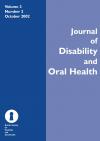Journal of Disability and Oral Health

- Cover Date:
- October 2002
- Print ISSN:
- 1470-8558
- Electronic ISSN:
- 1754-2758
- Vol:
- 3
- Issue:
- 2
Editorial
Equality in dental health care provision – what about disabled people?
One of the most important founding principles of the UK National Health Service was equality of health care. In general, governments have taken this to mean equality of access, but it should mean equality of opportunity. In the UK, most of us involved in health care still believe in that principle, but we do not always organise our services in a way that allows equal opportunities to all of our potential patients. In particular, disabled people are often excluded. People with physical or sensory disabilities, and those with learning difficulties may be discriminated against in at least two ways. First it may be difficult for them to get access to health services. Access barriers vary from the purely physical (steps into the surgery, absence of lifts etc), to the more bureaucratic. These may include the requirement to fill in a form that you may not be able to see or understand in order to gain access to a list. Secondly, they often have major problems communicating with health care professionals. People with behavioural problems or learning difficulties, or those with cerebral palsy and other physical impair ments may not be as easy to communicate with as other patients. Extra time and skill are required on the part of the health care professional. The Health Council is a part of the Disability Partnership (incorporating the Prince of Wales’ Advisory Group on Disability). It is trying to help change the emphasis in the education of undergraduate and postgraduate health care professionals so that more emphasis is put on disability. In our view, education and research puts too much emphasis on the causes and cures of disease and not enough on their consequences. Disability is one of the key consequences, and the prevalence of disability is rising alarmingly. There are many causes of this, most notably the ageing population and the improvements in medical treatments. This now leaves many people who might previously have died from their disease alive, but with serious impairments to functioning. In order to help teachers educate their students about disability we are producing a series of small booklets about different aspects of disability. The first two in the series are already available: ‘One-in-Four-of-us’ is about physical disability and ‘Special or Different’ concentrates on learning difficulties.
- Article Price
- £15.00
- Institution Article Price
- £15.00
- Page Start
- 50
- Page End
- 50
- Authors
- Paul Dieppe, Peter Holland
Articles from this issue
- Title
- Pg. Start
- Pg. End
- Swalloaid, a new prosthetic appliance for edentulous elderly people with dysphagia: a case report
- 72
- 76
